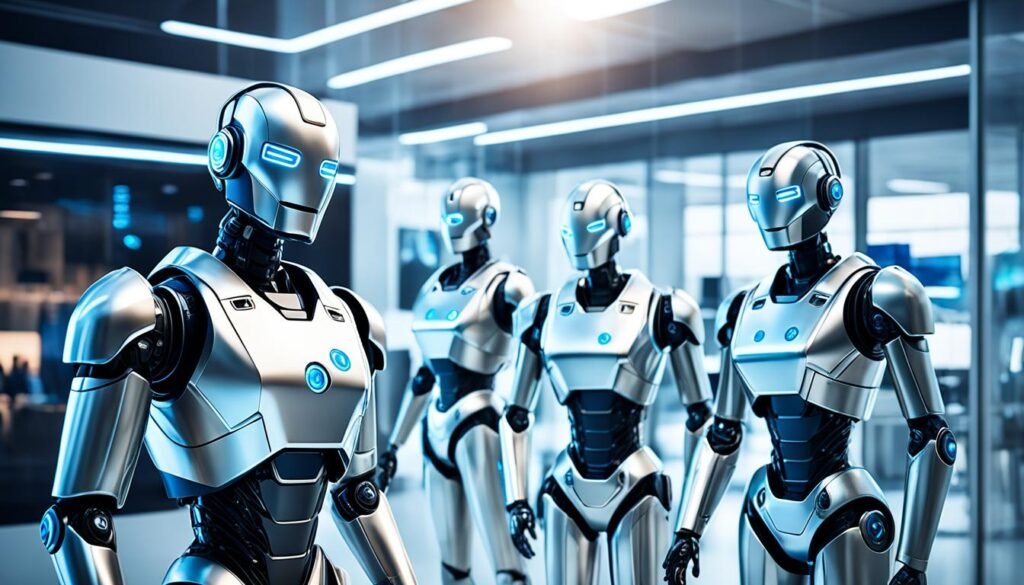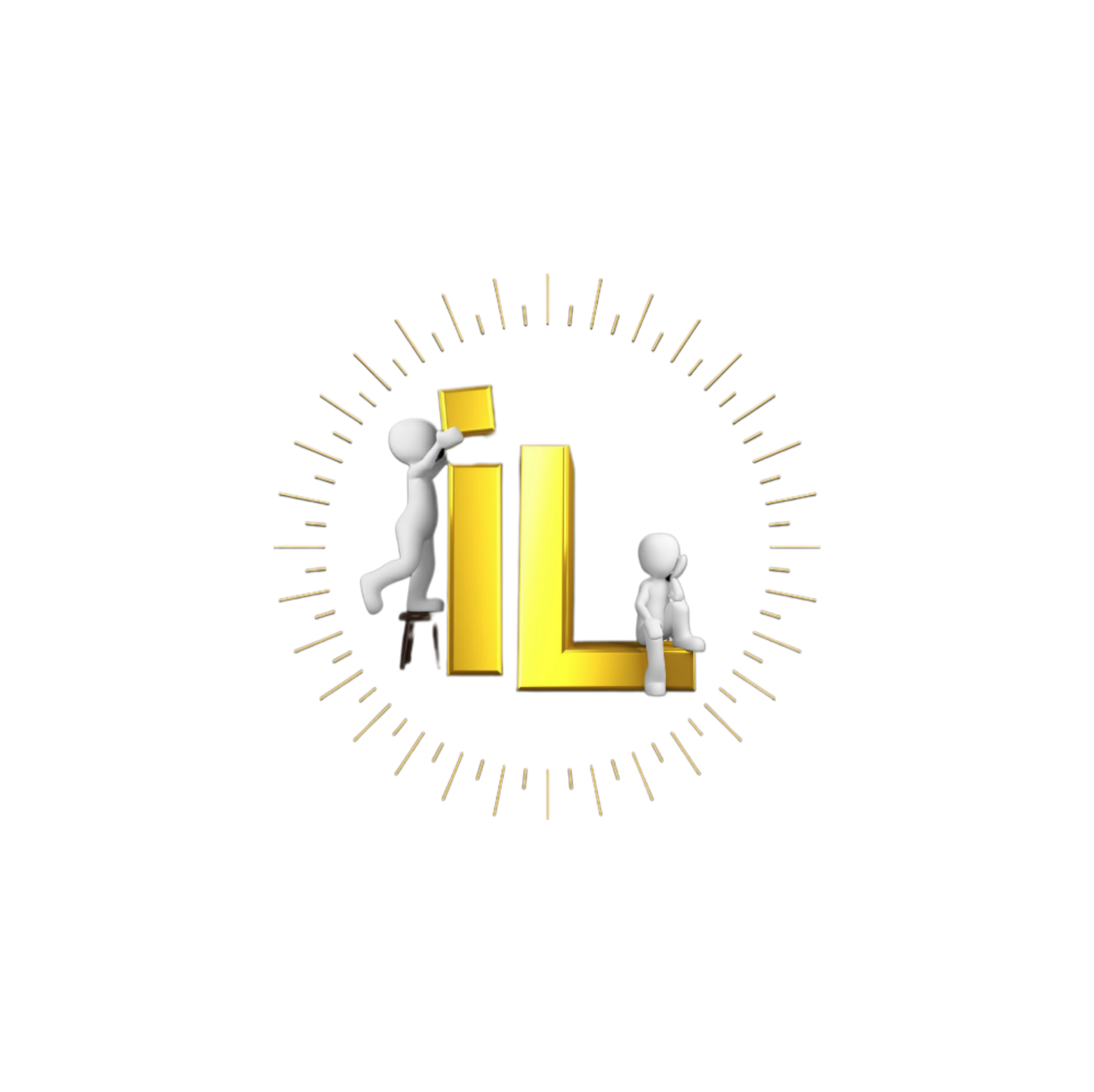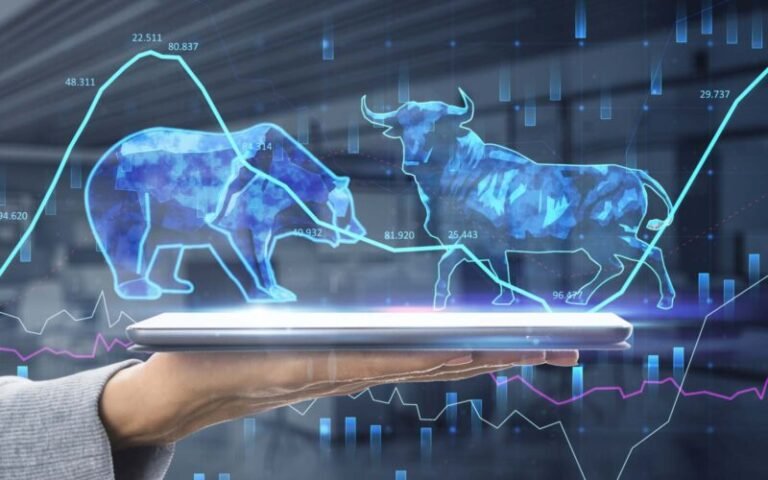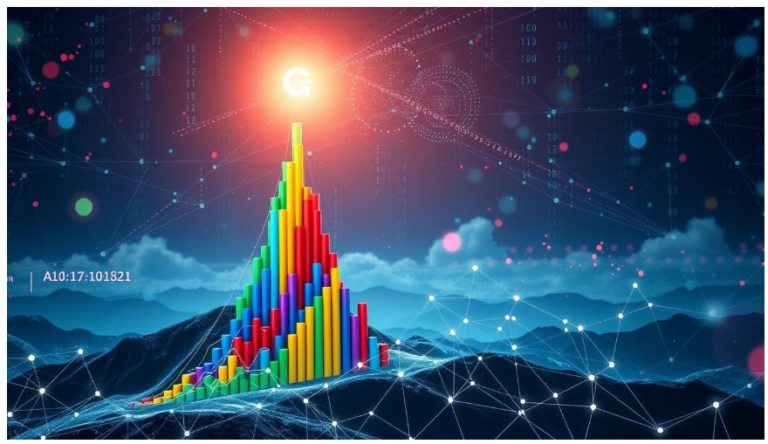Have you ever wondered about using algorithms to change entire industries and our daily lives? This is the goal of Artificial Intelligence (AI). It leads the way in tech innovation.1 AI is getting smarter, with the potential to handle up to 45% of today’s tasks.1 Its effects reach further than just doing work for us. It’s changing how we work, live, and see the world around us.
Algorithms are the core of AI’s change. They are detailed rules that direct AI to process loads of data. This helps AI recognize patterns and make choices or predictions.1 Algorithms make AI very powerful. They let AI do things more efficiently and accurately than humans can. AI’s reach, from healthcare to finance, is growing. It brings efficiency, new ideas, and competition.

Key Takeaways
- Artificial Intelligence is changing industries and our lives
- Algorithms are the heart of AI, guiding it to solve problems
- AI might handle up to 45% of current tasks, impacting several areas
- AI boosts efficiency, creativity, and competition in different fields
- The rise of AI opens new doors and changes how we live and work
AI’s influence is expanding, along with hard questions and ethical concerns. How do we ensure AI’s benefits are fair to all and don’t worsen biases or invade privacy? These big issues need attention as AI keeps evolving. Come with us to see how Artificial Intelligence is changing the future. We’ll talk about the chances and difficulties it brings.
The Development of Artificial Intelligence
The growth of artificial intelligence (AI) has been fascinating. It has seen new achievements and steady progress.2 In 1943, Warren McCulloch and Walter Pitts suggested an artificial neuron model. This idea paved the way for AI.2 Soon, AI moved from theory to real-world use thanks to Donald Hebb’s Hebbian learning in 1949.2
Algorithms: The Driving Force Behind AI
Algorithms are the heart of AI’s journey. They are the instructions that direct AI models. These models process data to find patterns and make choices.2 The data they work with is critical. It affects how well the algorithms perform and what they achieve.2
Machine Learning and Neural Networks
In 1956, researchers found that a machine with enough memory could solve any problem. This led to the creation of the General Problem Solver (GPS) program.3 This discovery set the stage for more advanced AI algorithms and systems.3 In the 1980s, AI gained new interest. This was sparked by machines beating humans at games like checkers and chess, as well as improving in computer vision and speech recognition.3
The early 2000s heralded a major breakthrough. Self-learning neural networks started performing better than humans in sorting objects and translating text.3 During this time, reinforcement learning algorithms were also made. These algorithms let AI systems learn complex behaviors with little data.3 The last decade has been big for computer vision and natural language processing tools. These tools heavily rely on deep neural networks for their functions.3
Natural Language Processing and Computer Vision
Natural language processing (NLP) and computer vision have greatly expanded AI’s reach.3 NLP lets machines understand and use human language. Computer vision helps AI see and analyze images.3 These steps forward have led to smart software, chatbots, and virtual assistants. Now they can handle conversations and complex visual tasks.3
The evolution of AI continues, spurred by smart algorithms and new learning methods. Ideas like the Internet of Things (IoT) add to this progress.3 With every step, AI is opening doors to new knowledge and changing industries. This future looks bright.3
Impact of AI on Various Industries
AI, powered by advanced algorithms, is changing many fields. It brings efficiency, new ideas, and makes industries more competitive.4 In healthcare, AI is used to look at medical pictures. This helps doctors diagnose illnesses faster, which can lead to better treatments for patients.4 In finance, these algorithms help make investing better, spot fake transactions, and offer personalized help in banking.4 AI is not just in these areas; it’s also making big changes in farming, making things, learning, and fun. It’s finding new ways to grow and evolve.
Healthcare and Medical AI Applications
The healthcare world is leading the way in using AI. It aims to cut down on mistakes made by people, help medical teams, and make patients’ experiences better.4 AI is making a big impact on finding new medicines. It speeds up the search for drugs that can save lives.4
AI in Finance and Banking
In finance and banking, AI is all about giving customers more personalized service, making money plans better, and suggesting products that fit their needs.4 These technologies are critical for sniffing out fraud. They help keep both consumers and companies safe.
Retail and E-commerce AI Solutions
Retail and online selling are also using AI. They’re looking to get smoother, give customers better times, and sell more.4 By using data, AI helps stores figure out what people want. It makes supply chains more efficient and checks on product quality.4
AI in Manufacturing and Supply Chain
Artificial intelligence (AI) is changing the game in manufacturing and supply chains. It’s making everything more efficient, cheaper, and better in quality.5 AI-powered robots work faster and more accurately than people on repetitive tasks. This boosts productivity and cuts down on mistakes.6 Also, AI can look at sensor data and other info to make production smoother. It helps stop machinery from failing, which saves money on repairs.5
Predictive Maintenance with AI
AI is turning how we look at maintaining our equipment upside down. It can predict when machines might break and stop that from happening.6 With AI, we’re able to keep track of our inventory in real time. This stops us from having too much or too little of something.6 This way, our factories run more smoothly, and we don’t waste money.
AI-Powered Quality Control
AI is also a big deal when it comes to checking product quality.5 It finds any flaws way better than a person can, making sure only top-notch products get sent out.6 Using AI means there are fewer mistakes on the job and less chance of accidents. This boosts how well we work, our precision, and it cuts costs.6
| Key Benefits of AI in Manufacturing and Supply Chain | Metrics |
|---|---|
| Reduced Logistics Costs | 15% reduction5 |
| Improved Inventory Levels | 35% improvement5 |
| Enhanced Service Levels | 65% improvement5 |
| Anticipated Machine Automation Growth | Doubling over the next 5 years6 |
| Forecasted Growth in IIoT Platforms | 40% CAGR from 2018 to 20246 |
The development 0f artificial intelligence in Transportation
The way we move is changing because of AI. It’s big in self-driving cars. Companies like Tesla and Google are all in. They see it as a way to cut down on accidents and traffic jams. These cars can use less fuel and make the air cleaner, too.
Self-Driving Vehicles and Autonomous Systems
The DOT’s ARPA-I is looking into using AI in all transport.7 This is thanks to an Executive Order that talked about using AI safely and securely.7 They want ideas by July 2, 2024.7 Dr. Hampshire thinks AI will really change how we get around. He says it could make things safer, cleaner, and fairer for everyone.
AI in Logistics and Route Optimization
AI is making big changes in how we plan routes and deliver goods.8 It’s set to make a $3.5 Billion impact by 2026.8 Autonomous vehicles could cut costs by 45%, says McKinsey.8 And dealing with road damage in the USA costs a lot. There are also many accidents because of tired driving. AI can use all kinds of data to pick the best routes. This not only saves money but also makes us all happier with our deliveries.

AI and Software Development
Artificial intelligence (AI) is changing software development for the better. It’s becoming a key tool for developers, helping them create top-notch software.9
AI-Assisted Coding and Testing
AI helps developers by spotting and fixing code errors. It suggests ways to make software better and safer.9 Also, AI can handle parts of the development process like testing. This cuts down on time and costs, making software better in the end.9
Intelligent Software Applications
Thanks to AI, we now have intelligent software applications. These apps learn from how people use them and adjust to suit their needs. This makes software more personal and useful, making user experience better.9 They use technologies like machine learning, natural language processing, and computer vision. These help create user interfaces that feel natural and smart.10
AI is making a big mark in software development. In fact,1170% of developers say AI tools help them work better and faster.11 AI will change the way software engineers work. But, it won’t take their jobs. Human developers are still crucial for complex tasks and strategic planning.11
The11global AI market is set to grow by 37.3% by 2030. This means more AI in software development. It will help streamline coding, handle bugs, plan projects, assign resources better, and fill in skill gaps.1110
Yet, bringing AI into software development has its challenges. Developers need to deal with issues like relying too much on AI, changing how search engines work, data privacy risks, and trust in AI’s output.11 As the field progresses, overcoming these challenges is key to making the most of AI in software.
| AI-Assisted Coding and Testing | Intelligent Software Applications |
|---|---|
| Analyzes code to identify errors and suggest improvementsAutomates testing and debugging, reducing development time and costsEnhances overall quality and security of software applications | Learns from user behavior and adapts to their needsLeverages machine learning, natural language processing, and computer visionProvides intuitive and context-aware user interfaces |
The Rise of Chatbots and Virtual Assistants
The field of artificial intelligence (AI) is ushering in a new wave of smart software tools – like chatbots and virtual assistants. These are powered by cutting-edge natural language processing (NLP) and machine learning. They can engage with people either through typing or talking.12 They’re particularly gaining ground in different sectors, such as customer service, health, and finance.
Chatbot Applications in Customer Service
In customer service, chatbots are game-changers, making client communication smoother. They offer instant help, answering common questions and suggesting tailored solutions.12 By juggling many customer queries at once, they cut down on wait times and boost satisfaction.
AI-Powered Virtual Assistants
AI-driven virtual assistants are also on the rise, giving users custom and on-the-spot support. These assistants use advanced machine learning and NLP techniques to lift user experience and satisfaction.12 Their wider use means companies can use smart tech to simplify customer communication and offer better, faster service.

Challenges and Ethical Considerations
AI comes with many good things, but there are also big problems and ethics to think about. The biggest issue might be losing jobs to machines. As more AI is used, we might not need as many people to work. This could make many jobs go away, causing problems like not having work and people being unhappy.13
AI and Job Displacement
Adding AI to jobs is making some people worry about their futures. AI can do tasks that people used to do. This change might mean some jobs won’t be needed anymore. Workers may have to learn new things to keep working.13 Leaders and lawmakers need to help by making sure workers are ready for new kinds of jobs.
AI Bias and Fairness
AI could show unfairness because of the ways it learns. If the data AI learns from is biased, AI decisions can be unfair. This could be a big problem in places like lending, where past bad practices could come back.14 Making AI fair and clear is very important to avoid these problems and to trust the technology.
Privacy and Security Concerns
Using AI a lot can also make people worry about their privacy and safety. AI systems often gather a lot of personal info. This info could be in danger of being stolen or used wrong.14 Another worry is AI watching people too much, which is bad for privacy. Having strong rules and protections for this data is key for people to trust AI.
The Future of AI Development
AI technology is making big leaps. It’s all thanks to better hardware and more computing power.15 By 2021, $93.5 billion was invested in this area, hinting at even bigger boosts soon.15
Advancements in AI Hardware and Computing Power
Better AI hardware and more power lead to smarter AI apps. Neural networks now have nearly 200 billion parameters.15 This means they can build more accurate models. It can take months to train these networks, but the results are groundbreaking for AI use.15
AI and the Internet of Things (IoT)
AI meeting IoT opens doors for better decision-making and control. It’s making waves in sectors like health and transportation.16 The link between AI and IoT is set to reshape many areas, including smart cities.16
AI’s future looks promising. We might even see artificial general intelligence soon.15 Plus, new technologies like neuromorphic processing will make AI better in many fields.15 As AI keeps growing, it will bring lots of changes. These changes will create both opportunities and challenges across the board.
FAQ
What are algorithms, and how do they power AI systems?
Algorithms act as the brains for AI systems. They offer sets of rules to solve problems or do tasks. By doing this, AI can look at lots of data, spot patterns, and make choices or guesses. Data is super important for AI. The more and better the data, the better AI can work.
How is AI transforming various industries?
AI, with its smart algorithms, is changing many fields. In health, it helps doctors by looking at medical images for faster diagnoses. This means treatments can start sooner, helping patients. In money matters, it finds good ways to invest, spots fraud, and makes banking personal. AI is even in farming, teaching, and fun stuff like movies, creating new chances to grow and improve.
How is AI revolutionizing the manufacturing industry?
Manufacturing is seeing big changes thanks to AI. AI-driven robots are faster and more accurate at their jobs, cutting mistakes and upping production. They work with data from sensors to run better and fix problems before they start, saving time and money.
Quality checks are also getting a boost. AI scans products for glitches better than people, ensuring top-notch items go out. This means happier customers.
How is AI transforming the transportation industry?
In travel, AI is really making a difference. Think self-driving cars, which might lower accidents and congestion while using gas more wisely. Big companies are putting a lot into this technology. AI not only pilots cars but also fine-tunes routes, reducing wait times and delivery hassle. By studying traffic and the weather, AI picks the best paths, saving money and keeping customers happy.
How is AI impacting software development?
AI is changing the way we create software. It checks code for mistakes and weak spots, upping the security and quality of apps. Letting AI handle certain development duties trims costs and time, improving the final product.
Smart software that learns from us is becoming more common. It adapts to our needs, making our experience better. This personal touch is thanks to AI.
What are the key applications of chatbots and virtual assistants?
Chatbots and virtual assistants are making big waves. They talk to us through text or speech. You’ll find them not just in customer service but also healthcare and finance. Chatbots make shop chats quicker, answer questions, and give advice. They’re like many helpers working at once, making waits shorter and visitors happier.
Virtual assistants offer personalized help when we need it, spicing up our experience. They too are getting more common, offering custom care and making users happier.
What are the challenges and ethical considerations surrounding AI?
AI is not without its problems. Job losses might happen as machines take over tasks. The worry is that some AI might learn bad biases, leading to unfair calls. There are also worries about our private info when AI systems need lots of data.
What are the future developments in AI technology?
The future of AI is very promising. We’re getting better hardware and more computing power for smarter systems. Tie that in with IoT, and we get a lot of cool new things. AI can use tons of real-time data to make things run better, delight users, and give us great new tips for business.
Source Links
- https://www.mckinsey.com/capabilities/mckinsey-digital/our-insights/where-machines-could-replace-humans-and-where-they-cant-yet
- https://www.javatpoint.com/history-of-artificial-intelligence
- https://www.red-gate.com/simple-talk/development/data-science-development/introduction-to-artificial-intelligence/
- https://executivegov.com/articles/ai-research-and-development-shape-future/
- https://gjia.georgetown.edu/2024/02/05/the-role-of-ai-in-developing-resilient-supply-chains/
- https://throughput.world/blog/ai-in-supply-chain-and-logistics/
- https://www.transportation.gov/briefing-room/us-department-transportations-research-agency-advances-work-incorporate-artificial
- https://www.modeshift.com/what-is-the-future-of-artificial-intelligence-ai-in-transportation/
- https://www.infoworld.com/article/3704270/ai-and-the-future-of-software-development.html
- https://cloud.google.com/blog/products/ai-machine-learning/how-ai-impacts-software-development
- https://www.pluralsight.com/resources/blog/leadership/AI-in-software-development
- https://www.riverpublishers.com/pdf/ebook/chapter/RP_9788770040723C4.pdf
- https://www.captechu.edu/blog/ethical-considerations-of-artificial-intelligence
- https://news.harvard.edu/gazette/story/2020/10/ethical-concerns-mount-as-ai-takes-bigger-decision-making-role/
- https://www.forbes.com/sites/forbestechcouncil/2023/04/10/the-future-of-artificial-intelligence/
- https://www.analyticsvidhya.com/blog/2023/04/future-of-ai/




